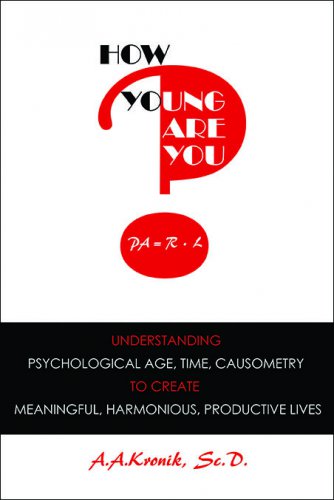
About the Author
Aleksandr A. Kronik received his Ph.D. and Sc.D. in psychology (1979, 1995), from the Russian Academy of Sciences, Institute of Psychology. He coined the term “Causometry,” for measuring the goal-and-causal connections between life events, so people could better understand their life visions, and change them when desired.
He is the author/co-author of eight books: Interpersonal Perception in Small Groups (1982), Psychological Time of Personality (1984/2008), Psychology of Significant Relationships (1989/1998), How Old Are You? The lines of life from the psychologist’s point of view (1993), LifeLine and Other New Methods of Life Path Psychology (1993), Some Archival Sources for Ukrainian-Jewish Genealogy (1998), Causometry: Methods of Self-knowledge, Psychodiagnostics, and Psychotherapy (2003/2008), Seven Me: A program of social and personal development for preschoolchildren (2005/2008).
Dr. Kronik is currently a licensed psychologist and maintains an independent practice in the Washington DC area, doing clinical work, research and consulting. He has treated numerous patients using his causograms and other causal and goal-based tools for improving lives.
HOW YOUNG ARE YOU? Understanding Psychological Age, Time, Causometry, to Create Meaningful, Harmonious, Productive Lives
A. A. Kronik, Sc.D.New Academia Publishing, 2018
146 Pages, 15 Illustrations, 12 tables
ISBN 978-0-9981477-8-9 Hardcover
For BULK ORDERS, order directly from New Academia Publishing.
Queries: orders@newacademia.com
About the Author
Aleksandr A. Kronik received his Ph.D. and Sc.D. in psychology (1979, 1995), from the Russian Academy of Sciences, Institute of Psychology. He coined the term “Causometry,” for measuring the goal-and-causal connections between life events, so people could better understand their life visions, and change them when desired.
He is the author/co-author of eight books: Interpersonal Perception in Small Groups (1982), Psychological Time of Personality (1984/2008), Psychology of Significant Relationships (1989/1998), How Old Are You? The lines of life from the psychologist’s point of view (1993), LifeLine and Other New Methods of Life Path Psychology (1993), Some Archival Sources for Ukrainian-Jewish Genealogy (1998), Causometry: Methods of Self-knowledge, Psychodiagnostics, and Psychotherapy (2003/2008), Seven Me: A program of social and personal development for preschoolchildren (2005/2008).
Dr. Kronik is currently a licensed psychologist and maintains an independent practice in the Washington DC area, doing clinical work, research and consulting. He has treated numerous patients using his causograms and other causal and goal-based tools for improving lives.
About the book
The main purpose of this research-based, self-help book is to introduce the goal-and-causal theory of “Psychological Time,” and to help you calculate your “Psychological Age”–that is, how old you feel, based on significant events in your life. You can also learn how to lower your psychological age (feel younger), using past experiences to move into the future, rejuvenating the mind for more satisfying personal growth, productivity, and happiness.
We humans created the convention of Time – hours, days, millennia. But we also created “Psychological Time,” which we can compress (to survive an interminable wait, for example), or expand (to luxuriate in pleasure). So fully-integrated into our brain is this “Psychological Time” that, as part of the illusion, we can lose touch with “real” chronological time altogether, and even change the sequence of past events to contradict or override our otherwise communal understanding of the world. In this book, you will generate “Causograms,” a kind of map that graphically represents your perception of the cause-and-effect and goal-based connections that your mind naturally makes between life experiences. These include, but are not limited to achievements, memories triggered by new experiences, and expectations based on prior accomplishments. This process allows you to re-examine the relation between life events, goals and personal interactions, then compare your resulting “Psychological Age” to your chronological age. The causograms and other tools offered here provide an introduction to the different mechanisms that contribute to Psychological Age, so that readers may use them to their advantage for the most creative, enjoyable, and fulfilling life possible.
See the video: https://www.youtube.com/watch?v=mA5t2oNK2gw
Praise
“Dr. Kronik is helping individuals understand their life and their timeline in a deeper, reflective level. He is at heart a cognitive social psychologist who has taken the most important of existential experiences and made it transparent for self-growth and research.”
―Linda Berg-Cross, Professor of Psychology, Howard University
“Dr. Kronik’s ideas are elegant and simple. His work is truly revolutionary. He has taken the most important of existential experiences and made them transparent for self-growth and research. This is a true contribution to American psychology.”
―Linda Berg-Cross, Professor of Psychology, Howard University
“Thanks beyond measure for your LifeLook Software and Guidebook. What a wonderful approach to the human life cycle. I am enjoying it immensely.”
―H. Keith H. Brodie, M.D., James B. Duke Professor of Psychiatry; President Emeritus, Duke University





 Coming Soon
Coming Soon Awards
Awards